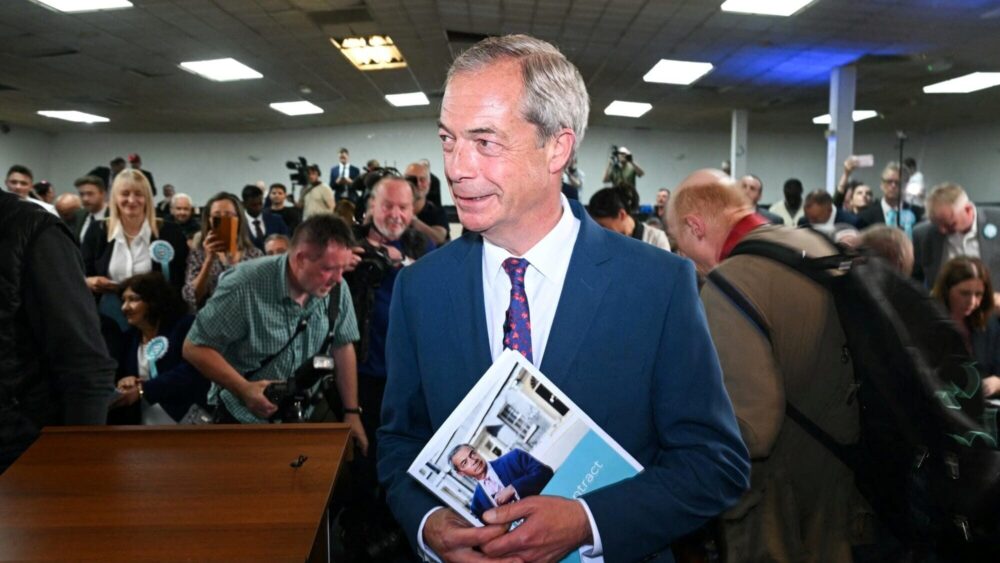
Leader of Reform UK Nigel Farage
JUSTIN TALLIS / AFP
The Conservatives and Labour have both released manifestos for the July 4th general election. But, as is customary, Reform UK has gone about unveiling its pledges a little differently.
Speaking in Wales on June 17th, leader Nigel Farage said Reform was not publishing a manifesto because “nobody believes now, frankly, a word that [these documents] say.” The party has instead released what it calls a “contract” with the nation.
LIVE: Reform launches Our Contract with You from the Labour heartlands https://t.co/UjaNaWgUqi
— Nigel Farage (@Nigel_Farage) June 17, 2024
After a national poll last week put Reform ahead of the Tories for the first time, party bosses chose Wales for the contract’s launch to signal that their long-term aim is also to take power away from Labour. Labour has been in control of the Welsh devolved government for more than 20 years and, as Farage put it, has made taxes “higher” and NHS waiting times “longer” than in England while also making education more and more “woke.”
Reform’s “core pledges” are:
There is a fair proportion of the contract that will appeal to genuine British conservatives—not least plans to tackle family breakdown, including by “supporting marriage through the tax system.” It is no wonder, then, that Phillip Blond, who is one of the main proponents of the “Red Tory” (economically left-leaning and culturally traditional) political movement, praised the 28-page document for containing “some ideas that I have long argued for or that I like.”
Others, including UnHerd editor-in-chief Freddie Sayers, have, however, complained that it is “ultra-Thatcherite” (largely meaning that it focuses too much on money), mainly because of its preoccupation with tax matters. Indeed, Farage regularly talks far more (though not exclusively) about the financial rather than the societal consequences of mass immigration and has been (affectionately) described by a long-term ally as a “Thatcherite Tory.”
Mail on Sunday columnist Peter Hitchens has long described Reform as “not conservative.” “They’re a Thatcher tribute band,” he says: “They’re economically liberal, closer to Liz Truss than to Edmund Burke.” Reform’s contract does not really dispel this feeling among some British conservatives, who are also more likely to be critical of the party’s plans for constitutional change, including getting rid of the House of Lords (Parliament’s unelected upper chamber) and introducing proportional representation.
But none of this is to suggest that Reform is not far closer on many key issues to the (generally quite conservative) electorate than the liberal elite, which make up both the Tories and Labour. That’s especially true when it comes to talking of boosting defence spending and Army numbers and introducing a ‘patriotic curriculum’ in primary and secondary schools. Also, for his often thankless work to achieve Brexit and to make migration an acceptable talking point (to the extent that even the mainstream news Channels now appear reasonably happy to discuss it), Farage is held in very high regard by many—if not most—on the Right.
Why does any of this matter? Farage says that this election is already over—that Labour will definitely win it. He added at the contract launch that this document “is not something with which we’re going to govern the country. That’s not possible in this election.” But he went on to say that
this election is … the first important step on the road to [the] 2029 [general election]. Our aim and our ambition is to establish a bridgehead in Parliament [by winning a handful of seats on July 4th] and to become a real opposition to a Labour government.
The latest polling suggests that Reform could win up to seven seats at this election.
